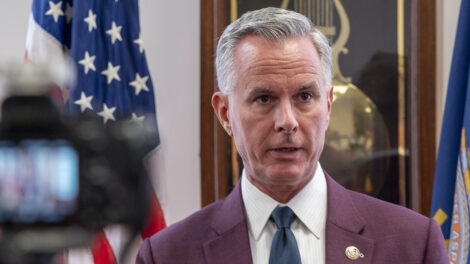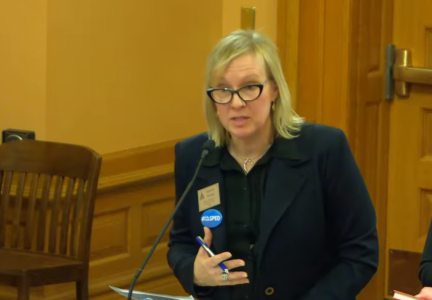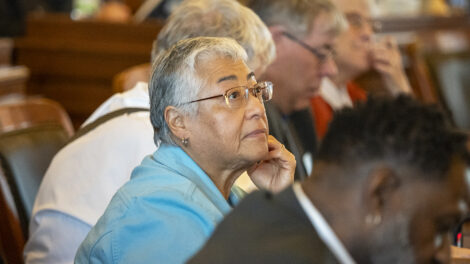Kansas Supreme Court clears way for grand jury probe of Kobach’s office

photo by: Thad Allton/The Topeka Capital-Journal via AP
Kansas Secretary of State Kris Kobach speaks during a news conference Tuesday, Feb. 17, 2015, in Topeka.
TOPEKA – The Kansas Supreme Court issued an order late Tuesday that clears the way for Douglas County to summon a citizen-initiated grand jury to investigate alleged criminal wrongdoing on the part of Secretary of State Kris Kobach’s office in its handling of certain voter registrations leading up to the 2016 elections.
In a one-page order, the court denied Kobach’s second request to review a June 8 ruling of the Kansas Court of Appeals, which said the Douglas County District Court must summon a grand jury to investigate the allegations.
Those allegations were originally made by Lawrence resident Steven Davis, who was a candidate for a seat in the Kansas House in both the 2016 and 2018 elections.
Davis has alleged that in 2016 the secretary of state’s office failed to properly register a number of voters who had filled out applications either at state driver’s license bureaus or online through the Kansas Department of Revenue’s website.
As a result, Davis alleged, officials in Kobach’s office, possibly including Kobach himself, may have violated various Kansas laws regarding the maintenance of voter registration rolls.
Kobach has dismissed the allegations as politically motivated. And Bryan Caskey, who heads the elections division in the secretary of state’s office, has said the allegations stem from minor technical issues involving the transfer of information between two computer systems and that those issues have long since been resolved.
Taking advantage of a rarely used Kansas law that dates back to the 19th century, though, Davis began circulating petitions in 2016 to summon a grand jury to investigate those allegations. Kansas is one of only a handful of states that allow citizen-initiated grand juries.
In June 2016, though, Judge Robert Fairchild, who was then chief judge of the Douglas County District Court, rejected the petitions, saying they failed to state specific allegations that, if true, would warrant an indictment.
At that time, there was no mechanism for Davis to appeal that decision. But during the 2017 legislative session, Kansas lawmakers amended the law to allow for an appeal process. So, in August of that year, Davis circulated a second set of petitions.
On that second try, new Douglas County Chief Judge Peggy Kittel again rejected the petitions. But taking advantage of the new law, Davis appealed, and in June — as Kobach was seeking the Republican nomination for governor — the Kansas Court of Appeals reversed the district court, saying the statute does not require specific allegations, but only general ones that, if true, would warrant an indictment.
One of the issues during the Court of Appeals process was that there were no attorneys to represent Kobach’s office. Initially, Kansas Attorney General Derek Schmidt’s office was called on to reply, but Schmidt’s office withdrew from the case, arguing that his office represents the state of Kansas, which had no particular interest in whether or not Douglas County summons a grand jury.
Kobach’s office then asked the Court of Appeals to reconsider its decision while simultaneously appealing to the Kansas Supreme Court, arguing among other things that his office had not been adequately represented in the case.
In September — not long after Kobach had won the GOP nomination for governor — the Supreme Court rejected his motion. Kobach’s office then filed another motion for the court to either reconsider or modify the Court of Appeals’ order, a move that delayed any final decision until after the election.
On Tuesday, though, the Supreme Court rejected that request as well. The decision came just two weeks after the Nov. 6 general election, which Kobach ultimately lost to Democrat Laura Kelly.
The next step in the process will be for the Court of Appeals to issue what’s known as a “final mandate” of its June 8 order, directing the Douglas County court to summon a grand jury.
A spokeswoman for the Office of Judicial Administration was not immediately able to say Wednesday when that would occur. Davis, however, said in an interview Wednesday that he believes a final mandate must be issued within seven days of the Supreme Court’s order, unless Kobach decides to appeal further to the U.S. Supreme Court.
“I think this is the last step in Kansas,” Davis said. “If he wants to get the U.S. Supreme Court involved, he has to say there’s a federal question. He has not alleged that so far. Really this is all based on Kansas law.”
Kobach’s office did not immediately respond to a request for comment Wednesday.





